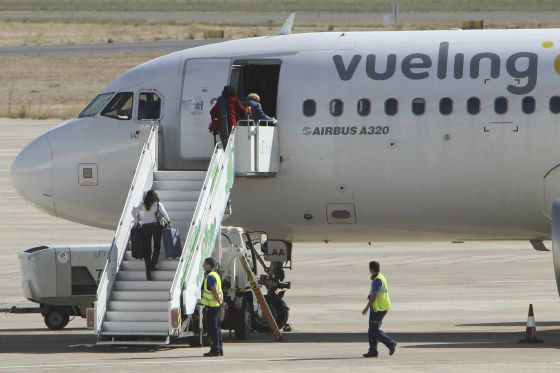El Consejo de Administración de la aerolínea se baja el salario el 25%
La compañía quiere rebajar los salarios de los pilotos al nivel de Vueling
Iberia quiere que los salarios de los pilotos que operan vuelos nacionales y europeos se sitúen en línea con lo marcado en el convenio de la aerolínea de bajo coste Vueling, lo que podría implicar rebajas de la remuneración de hasta el 47%. Esta es una de las propuestas que presentará a los sindicatos que representan a los trabajadores (UGT, CC OO y Sepla) a partir de la semana próxima para negociar el plan de ajuste que acaba de presentar y que incluye el despido de 4.500 personas, un 23% de la plantilla.
 |
| Sede central de Iberia en Madrid. / CHEMA MOYA (EFE) |
La aplicación del convenio de Vueling, empresa controlada por Iberia, supondrá una rebaja sustancial de los salarios de los pilotos de corto y medio radio: ahora su sueldo medio ronda los 194.000 euros anuales, frente a la media de 102.000 en vigor en la low cost, según los datos proporcionados este lunes por Iberia. Mientras tanto, la remuneración de un tripulante de cabina de Iberia asciende de media a 64.000 euros, frente a los 27.000 de Vueling, un 58% menos. “Hay que transformar el corto y medio radio y propondremos el convenio de Vueling, que es competitivo y, además, fue aprobado en su día por el Sepla [el sindicato de pilotos]”, avanzó este lunes el consejero delegado de Iberia, Rafael Sánchez-Lozano, en un encuentro con periodistas.
“Si hay acuerdo en este tema estamos dispuestos a estancar el crecimiento de Iberia Express”, añadió. La creación de esta línea de bajo coste en marzo fue la desencadenante del último conflicto que enfrentó a Iberia y los pilotos y que todavía no ha sido resuelto. Iberia Express, donde las remuneraciones son inferiores a las de Vueling, tiene ahora 14 aviones.
La dirección de Iberia tiene previsto reunirse con la ministra de Fomento, Ana Pastor, para explicar los detalles del plan de ajuste
Iberia, integrada en el holding IAG tras su fusión con British Airways en 2011, presentó la semana pasada uno de los ajustes laborales más duros de la historia de España. La aerolínea quiere suprimir 4.500 puestos de trabajo, de un total de 19.437, y quiere hacerlo aprovechando la reforma laboral con indemnizaciones máximas de un año de salario. También plantea rebajas de sueldo del 25% al 35% para la plantilla que siga en la compañía y un recorte del 15% de los vuelos en 2013 para centrarse en las rutas más rentables. Si no hay un acuerdo con los sindicatos antes del 31 de enero, la empresa ha advertido que tendrá que tomar medidas más drásticas. “Todo es negociable, pero si no hay acuerdo vía salarios, se hará con más ajustes de plantilla”, dijo el consejero delegado ayer.
Con estas medidas, Iberia espera detener el deterioro de caja a mediados de 2013 (destrucción de 468 millones en lo que va de año) y mejorar sus resultados operativos en 600 millones de aquí a 2015. La rebaja salarial también afectará a la cúpula de Iberia. Según dijo Sánchez-Lozano, el Consejo de Administración aprobó la semana pasada una rebaja de su salario fijo del 25% efectiva desde ya mismo, mientras los directivos no cobrarán en 2013 la remuneración variable ligada a objetivos conseguidos durante este ejercicio. “En ningún caso, el plan de ajuste figura como un objetivo a tener en cuenta en la remuneración”, aseguró el consejero delegado.
La dirección de Iberia tiene previsto reunirse este martes con la ministra de Fomento, Ana Pastor, para explicar los detalles del plan de ajuste de la aerolínea. Preguntado por la posibilidad de que el Gobierno interfiera en sus planes, Sánchez-Lozano se mostró convencido de que esto no será así. “Ni al Gobierno, ni a la empresa, ni a los empleados nos interesa que la compañía vaya mal; todos estamos del mismo lado”, dijo. Este lunes, el titular de Industria, José Manuel Soria, pidió “responsabilidad” a la aerolínea para alcanzar los acuerdos necesarios que permitan a la compañía continuar siendo “útil” para el sector turístico español.
http://economia.elpais.com/economia/2012/11/12/actualidad/1352750041_081800.html





